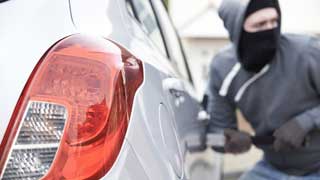Auto Theft
- Details
- Parent Category: Enforcement
- Crime Prevention
- Hits: 4425
In This Page |
 |
Many car owners, because of carelessness and unconcerned behavior, invite thieves to steal their car. The chances of having your car stolen are greatly minimized by simply removing the opportunity through a few precautionary measures.
If your car is too much trouble to steal, a thief will look for another car. Here are some simple steps to take that will make your car harder to steal.
Parking Your Vehicle
ALWAYS take the key out of the ignition, roll the windows up tight and lock the doors whenever your park your vehicle, even if only for a minute.
NEVER leave your motor running without you in it. It's unsafe, and it is also illegal.
Park in a well-lighted, busy spot if possible. A car thief would rather work where he is not seen. Check your car from time to time. If you have a garage, use it. Lock both your car and the garage. If you don't have a garage park in a driveway instead of the street, if possible.
When you park in an attended lot, leave only the ignition key. Do not give the attendant a full set of keys or any key on which a key code appears. Either invites the person to copy the keys. If you leave your house key, your home may become a target of a future burglary. Be sure to take the claim check with you to prevent a thief from using it to drive your car out of the lot.
Never hide spare keys in a secret place or in a magnetic key box under the hood or other accessible places. Car thieves routinely check the visors and ash tray and look under the floor mats. If you feel better with spare keys close at hand, then carry them with you.
After parking your car, set the emergency brake and put the car in park, or gear if it has a manual transmission. To make it difficult for a thief to illegally tow your car, turn the steering wheel sharply to the left or right and remove the key to lock the steering column.
Alarms and Auto Theft Deterrence Systems
Install locks that deter thefts, such as:
- Tapered door lock buttons, to keep thieves from using coat hangers to open your car doors from the inside.
- High-security ignition locks, which normally go around the steering column housing (sometimes these are known as "cuff locks")
- A "cane" or "J-bend" lock, which normally hooks up the steering wheel and the brake pedal.
- External and internal hood locks. These protect the battery from being stolen too.
Install other forms of disablers, such as:
- An ignition kill device, which interferes with the ignition system even if the car is "hot wired."
- A fuel cutoff device, which shuts off the fuel after running for a few seconds. All of these devices can be hidden.
- Install the best type of alarm that you can afford (silent alarms, sound discriminators, motion detectors, and computerized tracking transmitters are among the high-end devices now available). Be sure to advise potential thieves that you have an alarm by placing warning stickers on your windows or windshields.
Other Tips
DO NOT keep the car's title in the glove compartment; keep it at home. This will prevent a thief from using the title to "prove" he owns the car.
Do not keep anything of value in your glove compartment
Check periodically to be sure that your vehicle identification number (V.I.N.) is intact. This it the small metal plate, usually on the driver's side where the dashboard and windshield meet.
Put packages and valuables out of sight, in the trunk. These include such items as cellular phones, calculators, CB radios, tape decks, expensive sports equipment and clothing. Put these items away before parking your car. If your car has a button release, keep the trunk button locked.
When selling a car, DO NOT let a stranger take it for a test drive alone. A car thief will not be back to pay you for your car. If a prospective buyer wants to take the car to a mechanic for an appraisal, volunteer to deliver and pick up the car.
What to do if your car is stolen
If you discover that your vehicle has been stolen, call the police immediately. Speed is essential in recovering stolen cars; any delay in reporting only helps thieves. Many times the report can be taken over the telephone. The quicker the police get information about your vehicle, the quicker the Sheriff's Department and other Police Departments across the country can locate your vehicle, before it is stripped.
Here are a few other things you can do to help us recover your car:
- "Marking" your car can make it easier for the sheriff/police to identify your vehicle. One way is to drop a business card in the window slot. Another is to carefully engrave your initials inside the trunk, the hood, or even on the dashboard near the V.I.N. number.
- Carry a photocopy of your vehicle's current license plate registration and insurance card. This will enable you to relay numbers to the sheriff quickly if your car is stolen.
- Use discretion if you see someone tampering with your car. Call 911 as quickly as possible. Don't begin a fight with anyone, especially in a secluded area.
- Protect yourself when buying a used car. Verify the seller's name and address, and be sure that the V.I.N. on the registration card is the same as the V.I.N. on the car itself. Thousands of stolen cars are seized from innocent buyers every year.

